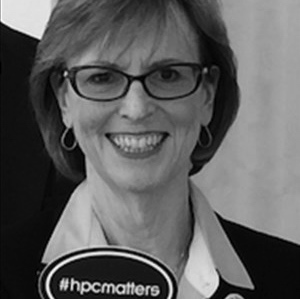By: Dona Crawford, Lawrence Livermore National Laboratory
 Last July, President Obama issued an executive order that created a coordinated federal strategy for HPC research, development, and deployment called the U.S. National Strategic Computing Initiative (NSCI). This bold, necessary step toward building the next generation of supercomputers has inaugurated a new era for U.S. high performance computing (HPC).
Last July, President Obama issued an executive order that created a coordinated federal strategy for HPC research, development, and deployment called the U.S. National Strategic Computing Initiative (NSCI). This bold, necessary step toward building the next generation of supercomputers has inaugurated a new era for U.S. high performance computing (HPC).
The executive order is a major, long-awaited initiative to ensure sustained American leadership in HPC. Although greeted with relatively little public fanfare or media attention, NSCI is, in fact, a very big deal not only to the U.S. scientific community but, I believe, the global HPC community as well.
Let’s revisit the five strategic themes of the NSCI and then talk about where the program is today, nearly six months after its creation.
1. Create systems that can apply exaflops of computing power to exabytes of data.
2. Keep the United States at the forefront of HPC capabilities.
3. Improve HPC application developer productivity.
4. Make HPC readily available.
5. Establish hardware technology for future HPC systems.
The lead agencies for the NSCI are the National Science Foundation, Department of Defense, and Department of Energy (DOE), the latter of which houses four of the five U.S. computers in the Top10. Through its national laboratories, DOE will likely have much to contribute to all NSCI objectives but most certainly will take the lead in fulfilling objective number one.
Since the NSCI was established, DOE has taken several measures to pave the way forward. Extreme-scale research and funding have been ongoing in DOE for many years, so we are not starting from scratch. What NSCI provides is a clear mandate from the president and a framework for collaborations within the administration. With the complexity and scope of the task and the magnitude of the expected outcome, we’re taking a deliberate, rigorous approach to consolidating our effort into a full-scale, formal project.
In December, the government reinforced its commitment to the initiative by funding FY16 exascale efforts in both the DOE’s Office of Science and National Nuclear Security Administration (NNSA). The first order of business for DOE is to assemble a leadership team and submit an initial proposal describing the mission-need for this computing capability and requesting formal approval to proceed. This requires the submission of documents and presentations as well as critical reviews by federal subject matter experts—a process that is paramount to moving the project forward.
Concurrently, HPC insiders from the DOE national labs, government, academia, and industry convened for a two-day workshop in October to discuss three “themes” central to achieving exascale: the convergence of data-intensive and numerically intensive computing, hardware technology for future HPC beyond Moore’s law, and improving productivity in HPC application development and deployment and workforce development. Doug Burger, director of hardware and devices at Microsoft Research, outlined his takeaways from the NSCI Workshop in an insightful blog.
The U.S. is not alone in making HPC a national priority. Countries big and small around the world recognize that HPC is essential for scientific discovery, national security, and economic competitiveness. As Dr. Cynthia McIntyre astutely pointed out in her TOP500 blog earlier this month, emerging and frontier market economies in Africa, the Middle East, Latin America, and Asia are mobilizing to invest in and utilize HPC for socio-economic benefit.
With so much of the world investing and marshaling the technological capabilities to develop next-generation supercomputers, the NSCI is timely. It is a critical step on the long, arduous journey that exascale computing represents for the U.S. But the new architectures, mathematical models and algorithms, programming concepts, software, and infrastructure that are expected to result from the initiative will surely benefit the global HPC community.
HPC is, today, a global enterprise. The NSCI will no doubt serve as a catalyst for the collaborations at the heart of the technological progress that enables the global scientific community to improve our security and quality of life.
